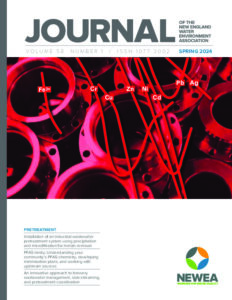New Hampshire Wastewater and Drinking Water Certification and Training Requirements
New Hampshire Wastewater Certification & Training Requirements
Contact for New Hampshire Wastewater Certification:
Mark Kondelis Sr.
NH DES, Wastewater Engineering Bureau
29 Hazen Dr.
P.O. Box 95
Concord, NH 03302-0095
Phone: (603) 271-5553
Email: mark.a.kondelis@des.nh.gov
Web Site
The New Hampshire Department of Environmental Services (NH DES) administers the certification of wastewater treatment facility operators. In New Hampshire there are four levels of certification for wastewater treatment facility operators based on facility complexity and design flow, with Grade I lowest and Grade IV highest.
At a minimum a high school diploma or its equivalent (GED) is required to attain wastewater certification in New Hampshire.
There are two certification exam opportunities per year (June and December). Both application and renewal fees are $50 for a two year cycle. Exam applications must be received by DES at least 60 days prior to the exam date.
In summary an applicant for Operator Certification shall:
- Pass the written examination
- Meet the minimum operating experience and education requirements specified below:
| Grade | Operating Experience | Education |
| I OIT | 0 years | High School Graduate or GED |
| I | 1 year | High School Graduate or GED |
| II OIT | 1 year | High School Graduate or GED |
| II | 3 years | High School Graduate or GED |
| III OIT | 2 years | High School Graduate or GED, plus 2 years relevant post HS education |
| III | 4 years | High School Graduate or GED, plus 2 years relevant post HS education |
| IV OIT | 4 years | High School Graduate or GED, plus 2 years relevant post HS education |
| IV | 6 years | High School Graduate or GED, plus 2 years relevant post HS education |
Note: OIT = Operator in Training
Relevant post-high school education shall include the following:
- For programs in sanitary engineering, environmental technology or studies, water treatment, or wastewater treatment, a bachelor’s degree shall be counted as 4 years of relevant education and an associate’s degree shall be counted as 2 years of relevant education;
- For programs in other relevant technical and scientific disciplines, such as natural sciences and non-sanitary engineering, a bachelor’s degree shall be counted as 3 years of relevant education and an associate’s degree shall be counted as 1.5 years of relevant education; and,
- Partial credit toward relevant post-high school education requirements shall be allowed for academic work or vocational training.
The applicant may request substitutions for required education with two years of in-plant operating experience.
For renewal of all grades, except I and I-OIT, the operator shall acquire a minimum of 2 CEUs (20 TCH) of training in the relevant field during the 2 year period prior to the expiration date of the certification.
Certification for Collection System Operators is a voluntary program administered through the New England Water Environment Association. This voluntary certification program has been established to promote the employment of trained, experienced, reliable, and efficient personnel for the operation of public and industrial wastewater works. There are currently four Grades of certification based on system complexity and flow capacity. Certification exams are held by the Collection Systems Certification Committee of NEWEA at time and places of their choosing. Further information on this program, and the voluntary wastewater laboratory analyst certification program, can be found at the NEWEA website.
New Hampshire Drinking Water Certification & Training Requirements
Contact for New Hampshire Drinking Water Certification:
New Hampshire Department of Environmental Services – WT, D, VSWS
Jason Smith
NH DES, Water Supply Engineering Bureau
29 Hazen Dr.
P.O. Box 95
Concord, NH 03302-0095
Phone: (603) 271-2410
Email: Jason.m.smith2@des.nh.gov
Web Site
In New Hampshire the Department of Environmental Services (NH DES) certifies water system operators. There are five levels of certification for water treatment facility operators based on treatment complexity with Grade A the lowest and Grade IV the highest. There are also five levels of certification for water distribution system operators based on population served with Grade IA the lowest and Grade IV the highest.
There are three exam opportunities per year. Applicants for examination shall:
- Be in a physical condition which enables an operator to satisfactorily perform his or her intended duties relative to the size and complexity of an operator’s particular water system;
- Be able to read and write in the English language; and
- Submit a $50 fee and completed application showing evidence of the following minimum number of years of education and experience for the desired operator grade:
| Certification Grade | Operating Experience | Education |
| IA | 6 months or completion of the “Small System Operations” course as specified in regulations | High School Graduate or GED |
| I | 1 year | High School Graduate or GED |
| II | 3 years | High School Graduate or GED |
| III | 4 years | High School Graduate or GED, plus 2 years post-secondary education |
| IV | 6 years | High School Graduate or GED, plus 4 years post-secondary education |
An applicant for grade I, II, or III certification as a water treatment plant or distribution system operator may take an examination in a given grade, if the individual has submitted to the department evidence of at least one half the required experience or of education or experience in technical fields other than water works, for the purpose of becoming an Operator-In-Training (OIT).
Certified operators must apply for certification renewal every 2 years and provide proof of having completed specified training, typically 20 training contact hours.
Additional Information:
New Hampshire Water Supply Engineering Bureau, Operator Certification Administrative Rules
The wastewater engineering bureau has started a job website for wastewater position in New Hampshire: http://des.nh.gov/organization/commissioner/hru/employ.htm


